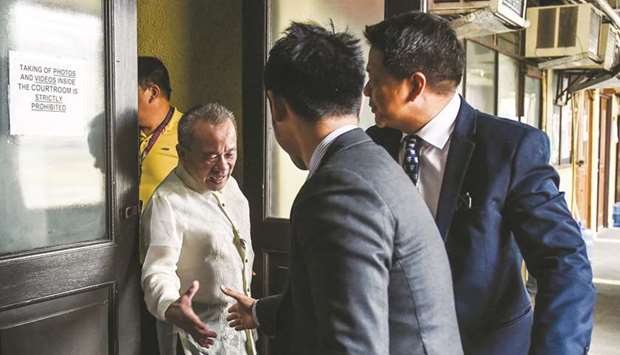A libel trial against the editor of Rappler, a Philippine news site critical of the regime of President Rodrigo Duterte, has begun in a case widely seen as an attempt by the government to intimidate journalists and curtail press freedom.
Maria Ressa was arrested and held overnight in February on charges of cyberlibel for a story published by Rappler in 2012, before being released on bail. She described the charges as “preposterous and baseless”.
In a statement yesterday, the first day of the trial, Ressa said: “This case of cyberlibel stretches the rule of law until it breaks.” She said: “How this is decided will have an impact on all Filipinos who post on Facebook – and of course, the quality of journalism in the digital age in the Philippines.”
It was the eleventh time in 18 months that Ressa had been hit with criminal charges relating to Rappler, in what many believe is a targeted, government-led witch-hunt against the news organisation.
Rappler, which is one of the most influential news sites in the Philippines, has also been one of the most critical of Duterte’s administration since he took power in 2016. In particular, it has scrutinised his government over the brutal war on drugs, which officially has taken more than 5,300 lives, though human rights groups allege the true figure is more than double that.
In response, Duterte has repeatedly described Rappler’s journalism as “fake news” and his government has hit Rappler and Ressa with a multitude of criminal charges, ranging from being illegally foreign-owned, to tax evasion and failing to file tax returns, all of which Ressa says are “trumped up” and an attempt to attack and intimidate critical journalists.
The cyberlibel charge relates to a story published on Rappler’s website in May 2012 that alleged ties between a Philippine businessman, Wilfredo D Keng, and a high court judge. However, as Ressa and her legal counsel have pointed out, the controversial cyberlibel law under which she is being prosecuted was enacted four months after the story was written.
The cyberlibel case was first brought in 2017, but initially dismissed by the national bureau of investigation. However, despite no new evidence, it was mysteriously reopened in 2018 and allowed to proceed to trial by the department of justice (DoJ).
Specifically in order to charge Ressa, the DoJ extended the liability period for cyberlibel cases from one to12 years.
Yesterday’s brief hearing, which Ressa did not attend, ended after testimony from two minor witnesses who were brought in by the DoJ, with the case set to resume on July 30.
Ressa’s refusal to bow to pressure from the Duterte administration has won her accolades around the world. She was among those named Time person of the year 2018, and won the 2018 Knight International Journalism award and this year’s prestigious press freedom award, given by the Committee to Protect Journalists.

Theodore Te (left), former Philippine Supreme Court spokesman and lawyer for journalist Maria Ressa, shakes hands with prosecution attorneys Ryan Cruz (right) and Joseph Banguis (centre) after the start of Ressa’s trial in Manila yesterday.
